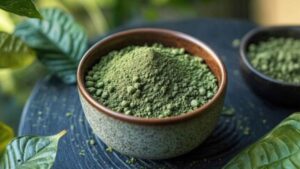With the increasing usage of Kratom, there comes the growing misgivings over its possible cardiovascular side effects. It is a comprehensive guide to the evidence and the professional opinion regarding the effects of kratom on the cardiovascular system and the controversies and current research on this topic, which guides a reader on the choices they may make.
In this blog, we’ll address the science of kratom and the heart, issues of blood pressure, potential advantages and dangers, and the effect of the strains on the cardiovascular system.
Kratom and Heart Health
Kratom (Mitragyna speciosa) is making its way as a herbal treatment for pain, mood enhancement, and energy. As its usage continues to spread, there exists such an important question: Is kratom heart-hurting?
The response is not so straightforward. As much as most people will use kratom without ostensible problems, an increasing amount of research and clinical testimonials point out critical issues, particularly among individuals who have pre-existing cardiovascular issues, high blood pressure, or arrhythmia.
Kratom Benefits and Composition
Kratom is a tropical tree whose leaves are rich in alkaloids—primarily mitragynine and 7-hydroxymitragynine. Depending on dosage, these compounds act as:
- Stimulants (low doses): Increasing alertness and energy, similar to caffeine.
- Sedatives (high doses): Producing opioid-like effects such as relaxation and pain relief.
Key Benefits:
- Natural pain relief
- Enhanced mood
- Increased energy or focus in lower doses
- Relaxation in higher doses
These benefits have made kratom a popular alternative to prescription painkillers and a sought-after wellness aid. However, its complex chemistry means its effects—wanted or unwanted—vary widely from person to person.
How Does Kratom Affect the Heart?
The primary pharmacological concern around kratom use centers on how its alkaloids interact with the cardiovascular system. Overall, kratom’s effects on the heart include:
| Effect | Cause | Most Common In |
| Increased heart rate | Stimulatory alkaloids at low doses | Younger, stimulant-seeking users |
| Elevated blood pressure | Vasoconstriction, stimulant response | Low–moderate doses |
| Irregular heart rhythms | Alkaloid interference with cardiac conduction | High doses, those with existing heart issues |
| Chest discomfort | Vasoconstriction or arrhythmia | Sensitive individuals |
| QT interval prolongation, cardiomyopathy, heart failure | Case reports/overdose cases | Chronic, high-dose, or polysubstance use |
Research Insights
- Increased heart rate and in rare cases, hypertension are the most commonly documented cardiac side effects.
- More serious problems have been attributed by case studies to high-dose or chronic kratom use, namely arrhythmias, QTc prolongation (an indicator of potentially life-threatening erratic rhythms), and, exceptionally, sudden cardiac events, in particular those with pre-existing heart diseases or with co-use of other drugs.
Kratom and Cardiovascular Side Effects
1. Tachycardia
- Often occurs at lower, stimulant-level doses.
- Most common acute cardiovascular side effect in poison control and ER reports.
- Occurs in about one-third of users who experience kratom side effects.
2. Hypertension
- Low-to-moderate doses can cause temporary increases in blood pressure due to stimulation of the sympathetic nervous system.
- Risk is heightened among those who already have hypertension or cardiovascular risk factors.
Effects can vary; some reports suggest possible blood pressure reduction at higher, sedative doses—though this isn’t well proven and is less common.
3. Arrhythmia and Cardiac Rhythm Disturbances
- Some case reports and laboratory studies associate kratom (especially mitragynine) with prolonged QT intervals and risk for rhythm abnormalities, which, while rare, can be dangerous.
- Underlying health conditions, genetics, and interactions with other drugs play an important role in risk.
4. Other Serious Effects
There are rare, severe cases of myocarditis, cardiomyopathy, heart attacks, and sudden cardiac arrest, which are often caused by overdose, chronic use, pre-existing heart disease, ora combination with other drugs.
5. Chest Discomfort and Vasoconstriction
Others feel tightness or pain in the chest area when subjected to doses of middle to high levels, probably as a result of vascular constriction or irregular beats.
Does Kratom Affect Blood Pressure?
The relationship between kratom and blood pressure is complex. It depends on the dose, the user’s physiology, and the strain consumed.
| Dose Level | Expected Blood Pressure Effect |
| Low (stimulant) | Tends to temporarily raise blood pressure |
| Moderate to high (sedative) | Can lower (less frequently) or normalize pressure (in some users) |
| Chronic or high-dose | Linked to fluctuating or sustained hypertension in predisposed individuals; risk for heart strain. |
Mechanisms:
- At low doses, stimulating effects cause blood vessels to constrict, increasing pressure and heart workload.
- Higher doses may offer sedative and vasodilating effects, sometimes lowering blood pressure, but this is less predictable.
Warning:
- Those with hypertension or taking blood pressure medications should avoid kratom due to potential interactions and unpredictable pressure changes.
Is Kratom Good for Heart Health?
Potential Arguments for Cardiovascular Benefits
- Anecdotal claims and forums occasionally suggest kratom helps soothe physical stress or reduce blood pressure at higher, sedative dosages.
- Rare reports exist of users with low blood pressure experiencing support, but there is no clinical evidence that kratom is safe or beneficial for heart health.
- No kratom strain is currently approved or recommended for cardiovascular benefit by the medical community.
Known Risks
- Regular or high-dose use, especially among those with cardiovascular conditions, may increase risk of adverse heart events.
- Studies have found increased risk of high blood pressure, irregular heartbeats, and cardiac toxicity in some cases.
- Users with underlying heart disease are particularly susceptible to negative effects.
Which Kratom Strains Impact the Heart?
Kratom comes in several main varieties:
- White Vein Kratom: Known for stimulating properties; more likely to elevate heart rate, blood pressure, and cause anxiety or restlessness.
- Green Vein Kratom: Balanced effects, but can still impose cardiovascular stress, especially in sensitive users.
- Red Vein Kratom: Considered calming or sedative at higher doses; may cause less marked heart rate increase, but is not risk-free, especially with overuse.
- Specialty/Enhanced Strains: These formulations may have higher alkaloid content and increase the risk of unwanted cardiovascular effects.
Risk Factors & Who Should Avoid Kratom
You should avoid kratom if you:
- Have a history of heart disease or arrhythmia.
- Have uncontrolled hypertension or are taking blood pressure medications.
- Are taking medications that interact with the heart’s rhythm or blood pressure.
- Have suffered previous strokes, heart failure, or cardiac arrest.
- Are pregnant, nursing, or have a history of substance dependence.
Practical Guidance for Kratom Users
- Know Your Health Background: Always consult with your doctor before using kratom if you have heart issues or other serious medical conditions.
- Start Low, Go Slow: Begin with the smallest possible dose to minimize side effects.
- Monitor Heart Symptoms: If you experience palpitations, chest pain, dizziness, hypertension, or fainting, stop using kratom and seek medical advice immediately.
- Avoid Poly-Substance Use: Combining kratom with alcohol, stimulants, prescription medications, or other psychoactive substances increases heart risks.
- Regular Health Checks: Routine cardiovascular monitoring is advised if using kratom regularly, especially for those over 40 or with risk factors.
- Purchase Reputable Products: Choose lab-tested, pure kratom from established vendors to avoid toxic adulterants that may further harm the heart.
Final Thoughts
Kratom is not to be used in individuals with heart diseases or major cardiovascular risk factors, and individuals who are devoid of medical issues must be cautious and abide by low dosing regimens and side effects.
The dangers to the condition of the heart are too high to be overlooked, and everybody who is thinking of availing themselves of the use of kratom must do so fully informed of these consequences that await them.
Before usage, it is always advisable to consult a qualified healthcare provider, particularly when there are medications in use, or heart or other blood pressure conditions.







